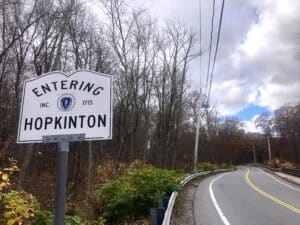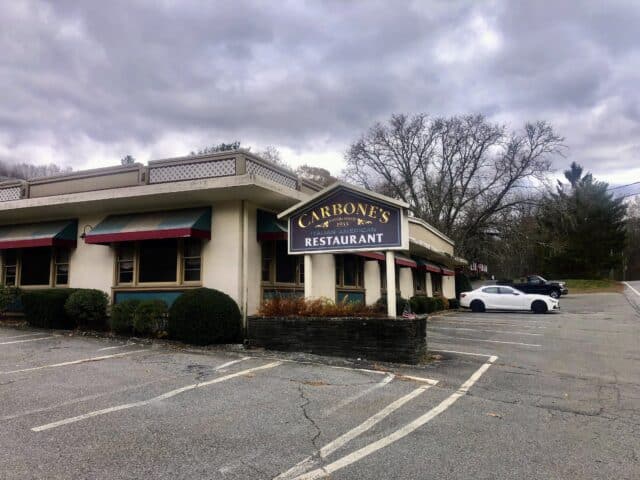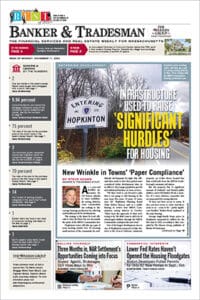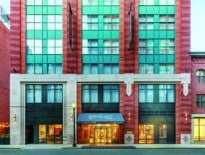
Hopkinton town meeting voters will take up a pair of overlay zoning districts on Nov. 18 to comply with the MBTA Communities housing production law. Photo by Steve Adams | Banker & Tradesman Staff
As a year-end deadline approaches for 130 Boston suburbs to enact multifamily zoning districts, some communities are seeking to discourage housing production by selecting undesirable parcels for development.
The strategy is the latest by local officials to obey the letter, but not necessarily the spirit, of the MBTA Communities law.
Hopkinton voters will take up a pair of town meeting articles Nov. 18 rezoning small sections of the community for multifamily development by-right. But officials have made it clear they picked areas considered tricky development sites, in an effort to discourage population growth and additional burdens on town services.
“We have tried to put forward a plan that is not going to add housing in the near term: five years, 10 years, 15 years, even 20,” Hopkinton Planning Board Chair Robert Benson said at a public hearing to review four MBTA Communities zoning districts in October. “That’s been the approach of what we’re trying to do. We didn’t want to add a lot of school-aged children through the MBTA Communities zoning in the near term.”
One of the largest development sites in one of Hopkinton’s proposed overlay districts is the 10-acre Carbone’s restaurant property on Cedar Street, located less than a half-mile from the MBTA’s Southborough commuter rail station.
But the property has “a significant amount of wetlands” and limited public utilities, noted Ted Barker-Hook, a member of a town advisory committee that recommended the zoning districts.
“It does not have access to sewer. It does not have access to water. And those seem to us – seem to be – pretty significant hurdles,” Barker-Hook explained at the same hearing.
Average single-family home prices in Hopkinton surpassed $1 million for the first time in 2023, according to data compiled by The Warren Group, publisher of Banker & Tradesman.
Under state regulations, Hopkinton is required to zone for at least 750 potential multifamily units on a minimum of 50 acres.
At recent public meetings, officials and residents focused on potential negative effects of housing development and population growth including higher property taxes, traffic congestion and public school budget increases.
Both town meeting articles also include parts of the downtown business district near the starting line of the Boston Marathon, where Routes 85 and 135 intersect near a CVS, the fire department headquarters and a vacant local drug store that’s already slated for redevelopment as apartments.
Costs Prohibitive for Smaller Projects
Another 129 cities and towns face the same Dec. 31 to comply with the MBTA Communities law, allowing by-right multifamily development on at least 50 acres to encourage housing production and increase affordability. The year-end deadline applies to communities with commuter rail stations and adjacent communities.
Housing advocates and engineers say the limited public water and sewer infrastructure in many suburbs located outside the MWRA district is an important factor in the current round of zoning debates.
Holden officials have cited additional water and sewer demand, along with erosion of local control, in refusing to submit an MBTA Communities zoning plan to the state Executive Office of Housing and Livable Communities. And Wrentham officials cited increased water and sewer costs among their reasons for resisting the rezoning requirement. The town has scheduled a Nov. 16 public forum to seek additional public comment.

Hopkinton’s proposed MBTA Communities multifamily zoning districts include a 10-acre restaurant property selected by officials because of the potential hurdles to its development. Photo by Steve Adams | Banker & Tradesman Staff
‘Unintended Consequence’ of Opposition
The MBTA Communities law does not require municipalities to upgrade utilities for projects that will be built under the new zoning, noted Clark Ziegler, executive director of Massachusetts Housing Partnership. That burden falls upon developers.
In fact, some housing developers have built private wastewater treatment plants to serve large-scale housing developments, Ziegler said.
“You can build treatment plants, but they cost several million dollars,” he said. “So, you need 200 to 300 bedrooms to justify the cost. From the community’s standpoint, there’s sort of an unintended consequence.”
One such massive development already exists in Hopkinton. Baystone Development’s 733-acre Legacy Farms project is approved for over 1,000 houses, condominiums and apartments, and is served by a large, on-site wastewater treatment plant.
The economics of designing and permitting private treatment plants for suburban housing developments often rule out smaller-scale projects, said Joseph Peznola, director of engineering at Danvers-based consultants Hancock Associates. Up-front costs for a treatment plant start at $1.5 million, and annual operation costs average $100,000, Peznola said.
“In my estimation, you’d need to be north of 200 to 300 units,” Peznola said. “If the town implements an MBTA bylaw that has vacant lots that are not big enough for a 300-unit project, then it’s going to be very difficult to realize the production of the units.”
Other suburbs including Arlington, Burlington and Chelmsford opted to rezone districts largely built out with existing housing and businesses, properties that are more expensive to acquire and redevelop. The strategy has become known as “paper compliance” because it satisfies the legal requirements of MBTA Communities while minimizing its housing production goals.

Steve Adams
Spilka Rebuts Rumors of Eminent Domain Takings
But even the “paper compliance” proposals have generated controversy in some towns.
During public meetings this year, condo owners in Hopkinton and Chelmsford warned that their properties could become desirable targets for eminent domain takings by the state if rezoned. Officials in both communities said they specifically included the properties, instead of vacant or underutilized parcels, to minimize the likelihood of development.
“There are some story lines that are getting out there that are crazy and conspiratorial,” said Amy Dain, a zoning researcher and consultant who’s been tracking the MBTA Communities law’s implementation for Boston Indicators.
Senate President Karen Spilka, whose district includes Hopkinton, sought to head off the speculation.
“Nowhere in the law does it allow the state to take a residence or property by eminent domain, and there have been zero conversations in the Legislature about that hypothetical, or anything remotely close to it,” Spilka’s office wrote in a statement submitted to the Hopkinton Select Board Nov. 4.





